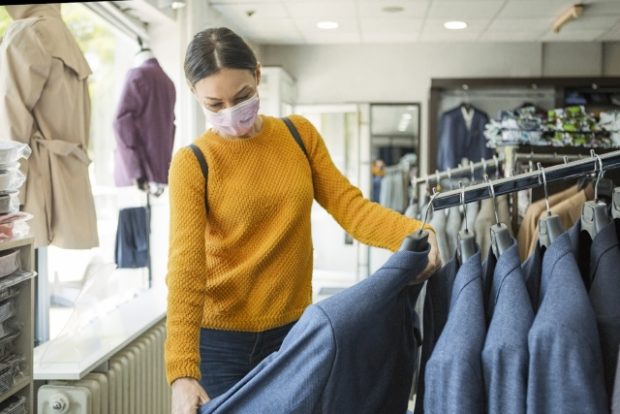Wearing a mask doesn’t give us a false sense of security, says study

Researchers say that wearing a face mask doesn’t lead people to neglect other good hygiene measures. Image: IStock.com/astasic via AFP Relaxnews
A new review published in BMJ Analysis has found that despite some concerns, wearing a face mask to prevent the spread of COVID-19 does not give people a false sense of security and lead them to forget about other good hygiene behaviors such as washing hands and maintaining social distancing.
Early on in the pandemic, the World Health Organization warned that wearing a face mask could “create a false sense of security that can lead to neglecting other essential measures such as hand hygiene practices”. To test whether face coverings do indeed lead to people feeling more relaxed and reducing other positive behaviors, an effect known as “risk compensation,” researchers at the University of Cambridge and King’s College London, United Kingdom, decided to look at the existing evidence.
The team said at least 22 systematic reviews have already investigated whether wearing a mask can prevent the transmission of respiratory virus infections. Though none of the studies set out to assess risk compensation or evaluate social distancing, the findings suggested that wearing masks does not reduce how frequently a person washes or sanitizes their hands.
In fact, in two studies participants actually reported washing their hands more when they were wearing a mask, and three observational studies found that people tend to move away from those wearing a mask, suggesting that masks might actually promote social distancing, not reduce it.
It is believed by some that risk compensation plays a role in several other everyday behaviors; a common example given is that mandating the wearing of bike helmets can actually lead to an increase in accidents. However, the authors say that other recent reviews have also failed to find evidence for risk compensation in this case.
Although the researchers point out that none of the studies included in their review have been peer-reviewed, meaning that they haven’t yet been verified by experts, they note that the idea of risk compensation could actually be the bigger threat to public health, as it could stop policymakers from making face coverings a requirement.
“The concept of risk compensation, rather than risk compensation itself, seems the greater threat to public health through delaying potentially effective interventions that can help prevent the spread of disease,” said lead author professor Dame Theresa Marteau from the behavior and health research unit in University of Cambridge.
“Many public health bodies are coming to the conclusion that wearing a face covering might help reduce the spread of SARS-CoV-2, and the limited evidence available suggests their use doesn’t have a negative effect on hand hygiene,” added co-author Dr. James Rubin from the department of psychological medicine in King’s College London.
Wearing face masks, especially in indoor public spaces, is now mandated or recommended in more than 160 countries to reduce the transmission of SARS-CoV-2, the virus that causes COVID-19. RGA
RELATED STORIES:
Barista gets over $74,000 in tips after woman without face mask shames him for not serving her
For more news about the novel coronavirus click here.
What you need to know about Coronavirus.
For more information on COVID-19, call the DOH Hotline: (02) 86517800 local 1149/1150.
The Inquirer Foundation supports our healthcare frontliners and is still accepting cash donations to be deposited at Banco de Oro (BDO) current account #007960018860 or donate through PayMaya using this link.